Reflective Report on Group Experience and Ethical Dilemma in ICT
VerifiedAdded on 2020/03/16
|13
|2257
|40
Report
AI Summary
This report provides a comprehensive reflection on a student's experiences with group work, ethical dilemmas, and the application of ICT in a professional context. The student details their participation in a group presentation on codes of ethics, highlighting their contributions, lessons learned about teamwork, and the importance of ethical conduct in the ICT field. The report then delves into an ethical dilemma scenario, outlining the student's decision-making process and the ethical elements considered, such as public interest and professionalism. The student also justifies their skills development, including effective communication, teamwork, and ethical behavior, alongside examples of how they've applied these skills. Furthermore, the report includes feedback on communication and collaborative technologies, with suggestions for improvement, and concludes with a comprehensive reference list. The report emphasizes the importance of ethical behavior, responsible use of ICT, and the development of essential professional skills.
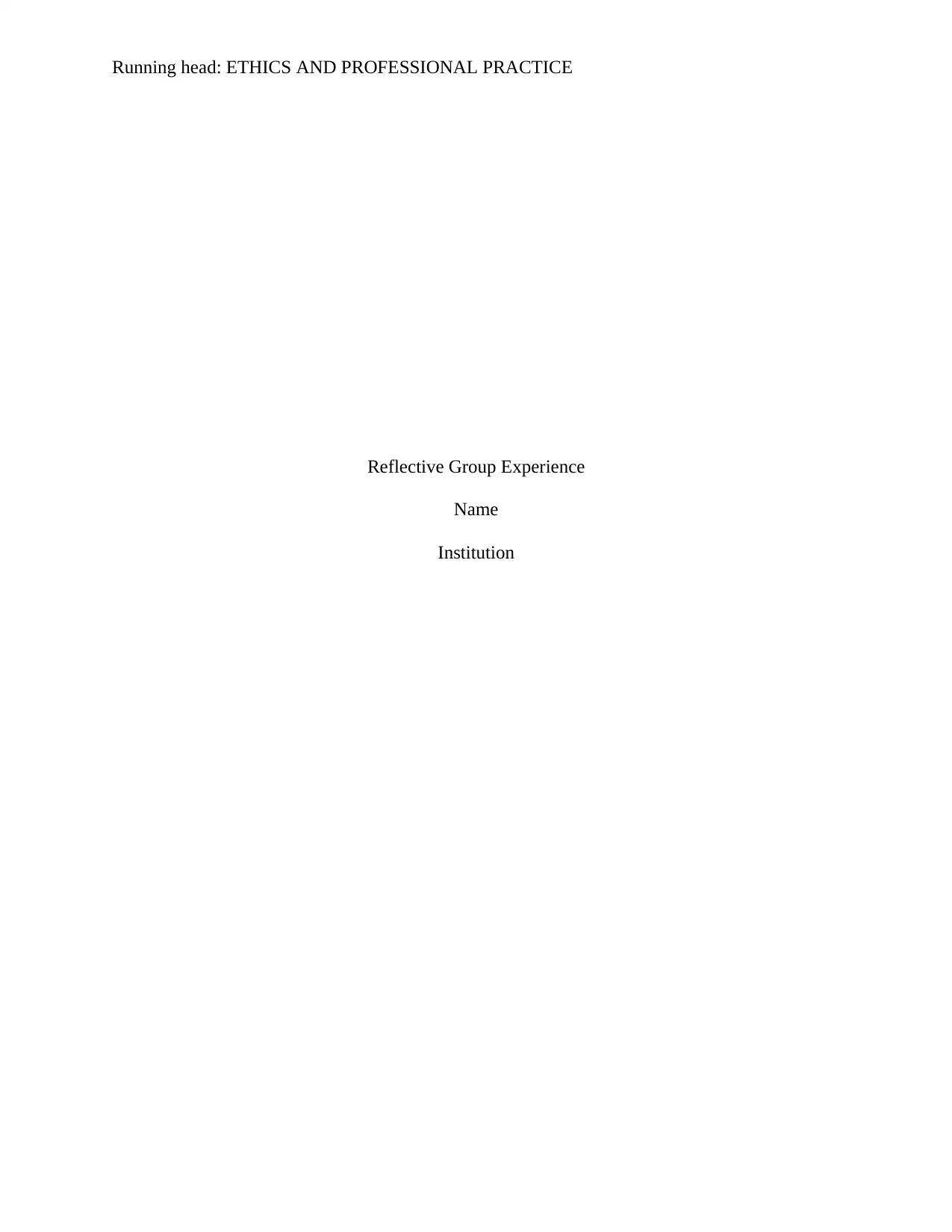
Running head: ETHICS AND PROFESSIONAL PRACTICE
Reflective Group Experience
Name
Institution
Reflective Group Experience
Name
Institution
Paraphrase This Document
Need a fresh take? Get an instant paraphrase of this document with our AI Paraphraser
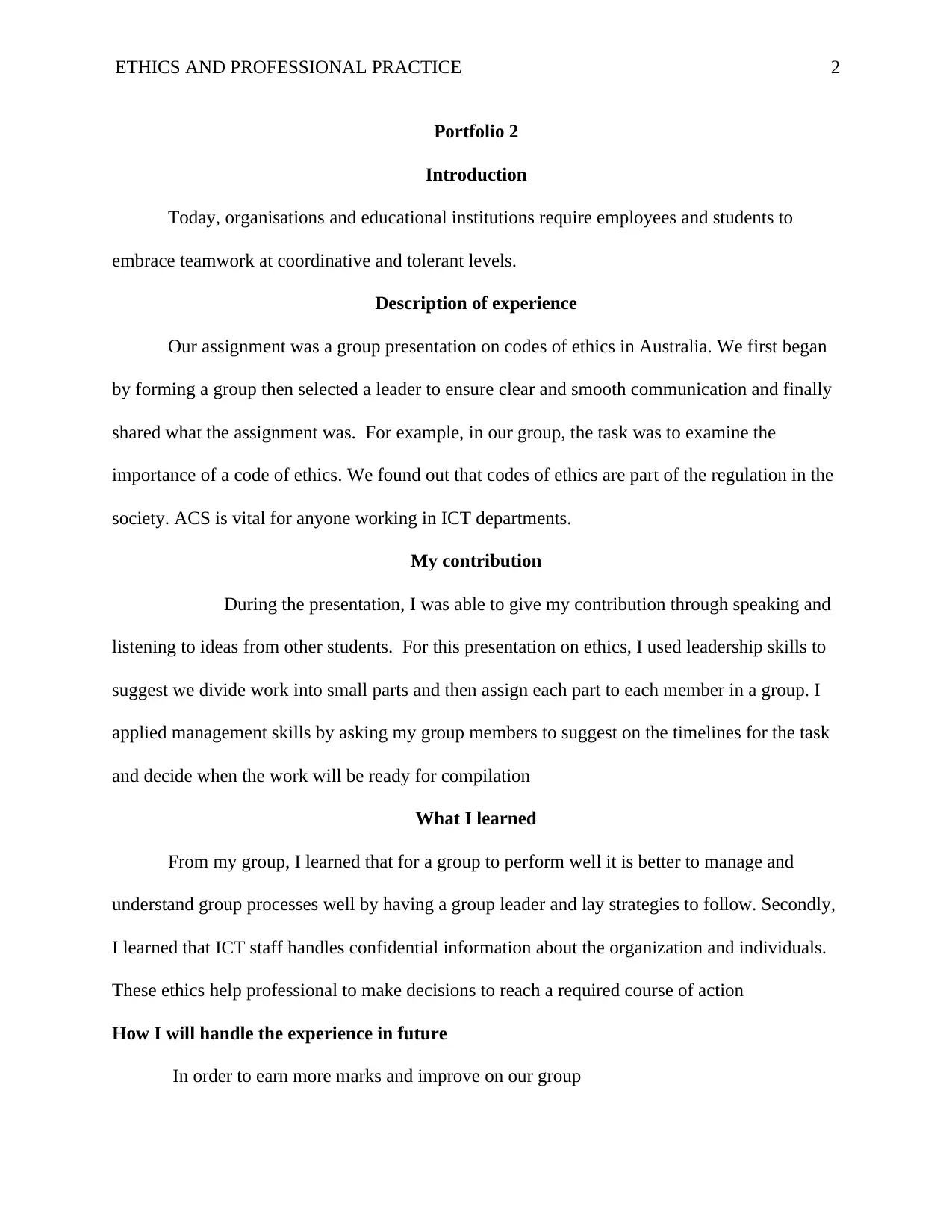
ETHICS AND PROFESSIONAL PRACTICE 2
Portfolio 2
Introduction
Today, organisations and educational institutions require employees and students to
embrace teamwork at coordinative and tolerant levels.
Description of experience
Our assignment was a group presentation on codes of ethics in Australia. We first began
by forming a group then selected a leader to ensure clear and smooth communication and finally
shared what the assignment was. For example, in our group, the task was to examine the
importance of a code of ethics. We found out that codes of ethics are part of the regulation in the
society. ACS is vital for anyone working in ICT departments.
My contribution
During the presentation, I was able to give my contribution through speaking and
listening to ideas from other students. For this presentation on ethics, I used leadership skills to
suggest we divide work into small parts and then assign each part to each member in a group. I
applied management skills by asking my group members to suggest on the timelines for the task
and decide when the work will be ready for compilation
What I learned
From my group, I learned that for a group to perform well it is better to manage and
understand group processes well by having a group leader and lay strategies to follow. Secondly,
I learned that ICT staff handles confidential information about the organization and individuals.
These ethics help professional to make decisions to reach a required course of action
How I will handle the experience in future
In order to earn more marks and improve on our group
Portfolio 2
Introduction
Today, organisations and educational institutions require employees and students to
embrace teamwork at coordinative and tolerant levels.
Description of experience
Our assignment was a group presentation on codes of ethics in Australia. We first began
by forming a group then selected a leader to ensure clear and smooth communication and finally
shared what the assignment was. For example, in our group, the task was to examine the
importance of a code of ethics. We found out that codes of ethics are part of the regulation in the
society. ACS is vital for anyone working in ICT departments.
My contribution
During the presentation, I was able to give my contribution through speaking and
listening to ideas from other students. For this presentation on ethics, I used leadership skills to
suggest we divide work into small parts and then assign each part to each member in a group. I
applied management skills by asking my group members to suggest on the timelines for the task
and decide when the work will be ready for compilation
What I learned
From my group, I learned that for a group to perform well it is better to manage and
understand group processes well by having a group leader and lay strategies to follow. Secondly,
I learned that ICT staff handles confidential information about the organization and individuals.
These ethics help professional to make decisions to reach a required course of action
How I will handle the experience in future
In order to earn more marks and improve on our group
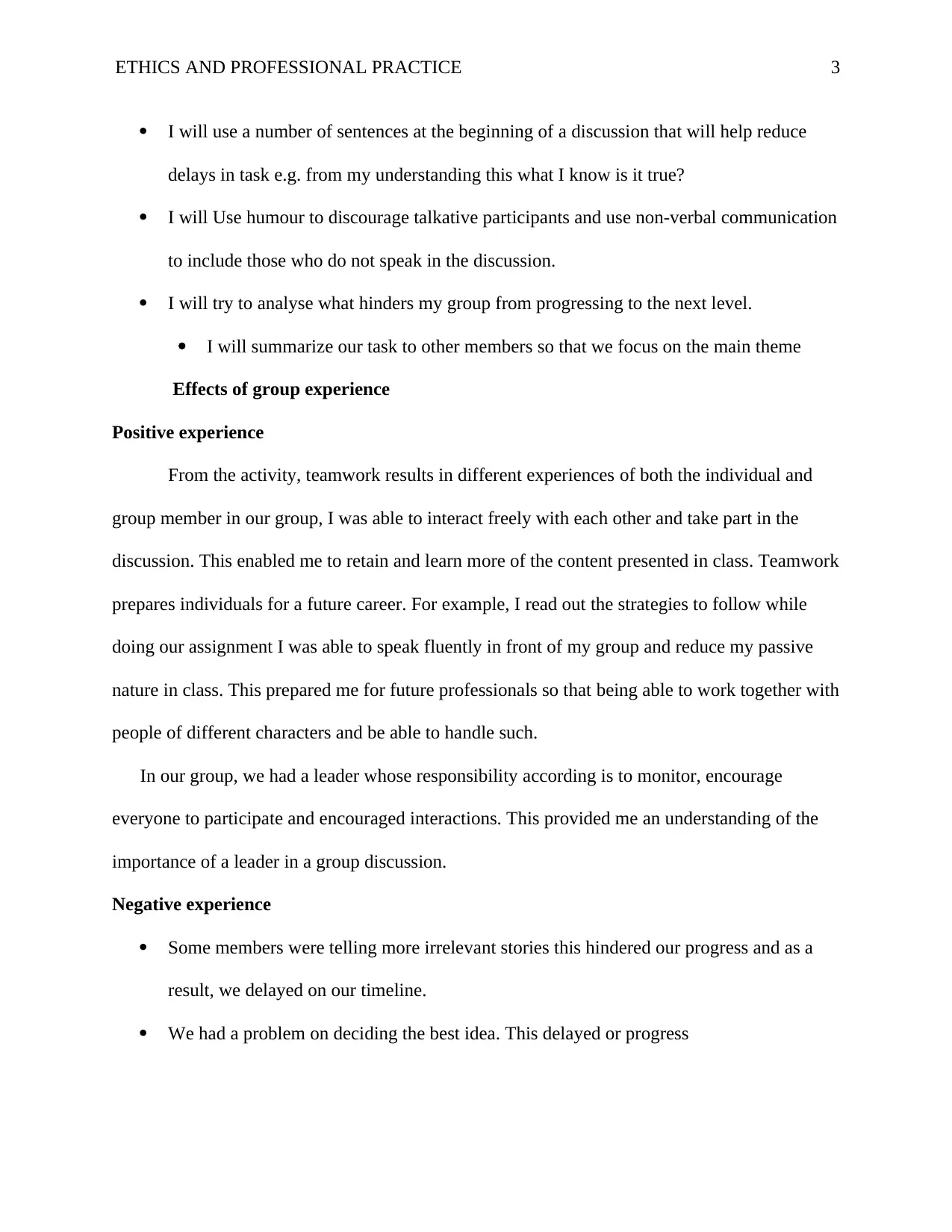
ETHICS AND PROFESSIONAL PRACTICE 3
I will use a number of sentences at the beginning of a discussion that will help reduce
delays in task e.g. from my understanding this what I know is it true?
I will Use humour to discourage talkative participants and use non-verbal communication
to include those who do not speak in the discussion.
I will try to analyse what hinders my group from progressing to the next level.
I will summarize our task to other members so that we focus on the main theme
Effects of group experience
Positive experience
From the activity, teamwork results in different experiences of both the individual and
group member in our group, I was able to interact freely with each other and take part in the
discussion. This enabled me to retain and learn more of the content presented in class. Teamwork
prepares individuals for a future career. For example, I read out the strategies to follow while
doing our assignment I was able to speak fluently in front of my group and reduce my passive
nature in class. This prepared me for future professionals so that being able to work together with
people of different characters and be able to handle such.
In our group, we had a leader whose responsibility according is to monitor, encourage
everyone to participate and encouraged interactions. This provided me an understanding of the
importance of a leader in a group discussion.
Negative experience
Some members were telling more irrelevant stories this hindered our progress and as a
result, we delayed on our timeline.
We had a problem on deciding the best idea. This delayed or progress
I will use a number of sentences at the beginning of a discussion that will help reduce
delays in task e.g. from my understanding this what I know is it true?
I will Use humour to discourage talkative participants and use non-verbal communication
to include those who do not speak in the discussion.
I will try to analyse what hinders my group from progressing to the next level.
I will summarize our task to other members so that we focus on the main theme
Effects of group experience
Positive experience
From the activity, teamwork results in different experiences of both the individual and
group member in our group, I was able to interact freely with each other and take part in the
discussion. This enabled me to retain and learn more of the content presented in class. Teamwork
prepares individuals for a future career. For example, I read out the strategies to follow while
doing our assignment I was able to speak fluently in front of my group and reduce my passive
nature in class. This prepared me for future professionals so that being able to work together with
people of different characters and be able to handle such.
In our group, we had a leader whose responsibility according is to monitor, encourage
everyone to participate and encouraged interactions. This provided me an understanding of the
importance of a leader in a group discussion.
Negative experience
Some members were telling more irrelevant stories this hindered our progress and as a
result, we delayed on our timeline.
We had a problem on deciding the best idea. This delayed or progress
⊘ This is a preview!⊘
Do you want full access?
Subscribe today to unlock all pages.

Trusted by 1+ million students worldwide
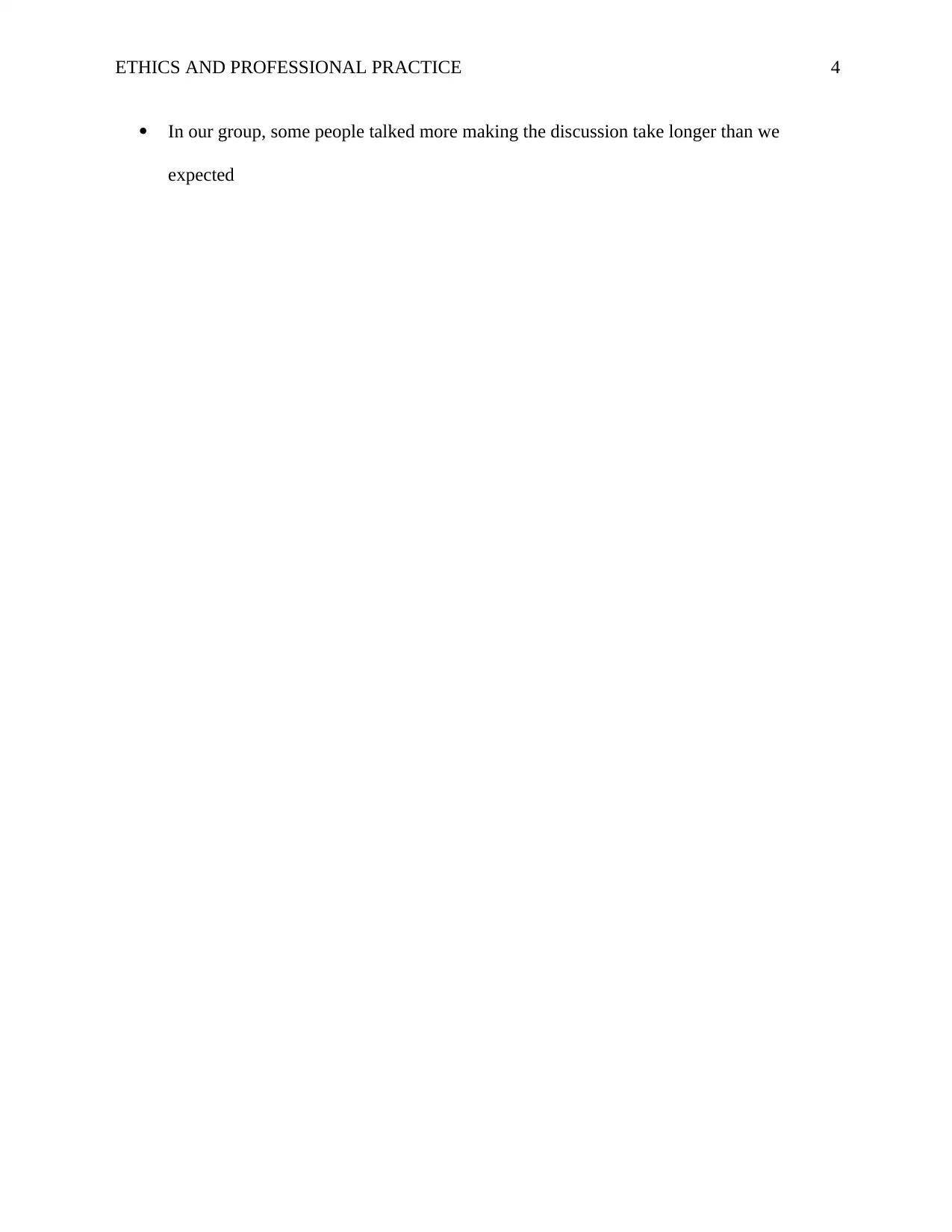
ETHICS AND PROFESSIONAL PRACTICE 4
In our group, some people talked more making the discussion take longer than we
expected
In our group, some people talked more making the discussion take longer than we
expected
Paraphrase This Document
Need a fresh take? Get an instant paraphrase of this document with our AI Paraphraser
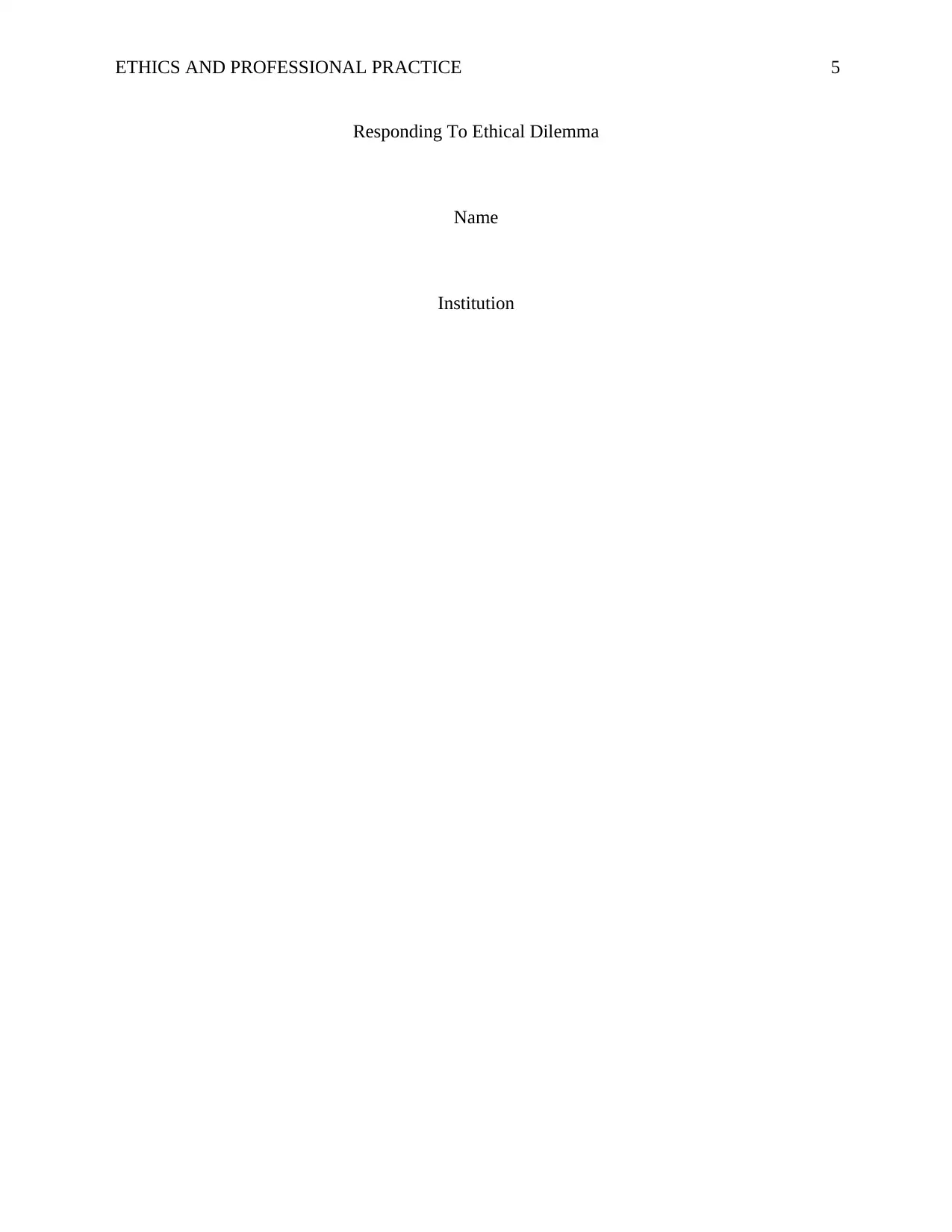
ETHICS AND PROFESSIONAL PRACTICE 5
Responding To Ethical Dilemma
Name
Institution
Responding To Ethical Dilemma
Name
Institution
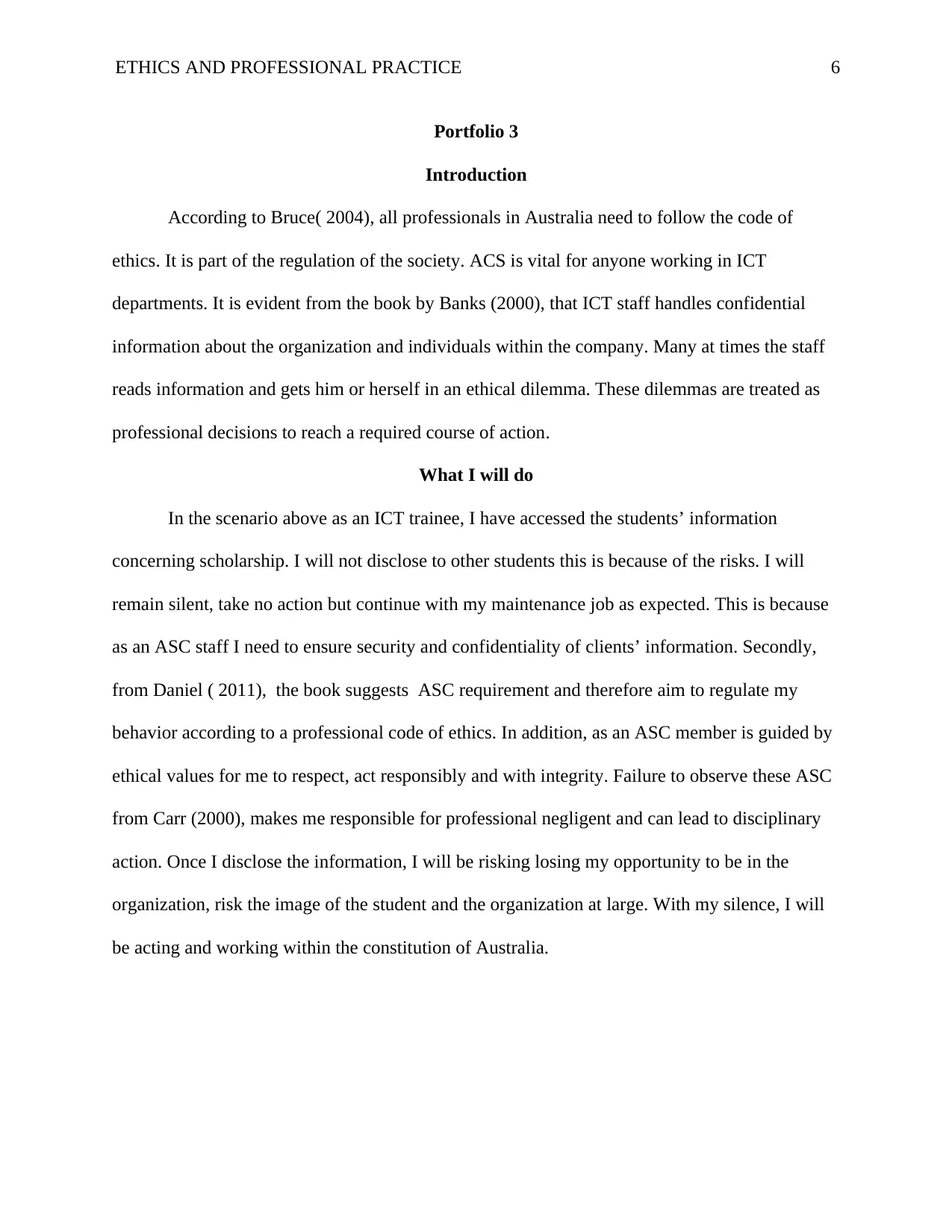
ETHICS AND PROFESSIONAL PRACTICE 6
Portfolio 3
Introduction
According to Bruce( 2004), all professionals in Australia need to follow the code of
ethics. It is part of the regulation of the society. ACS is vital for anyone working in ICT
departments. It is evident from the book by Banks (2000), that ICT staff handles confidential
information about the organization and individuals within the company. Many at times the staff
reads information and gets him or herself in an ethical dilemma. These dilemmas are treated as
professional decisions to reach a required course of action.
What I will do
In the scenario above as an ICT trainee, I have accessed the students’ information
concerning scholarship. I will not disclose to other students this is because of the risks. I will
remain silent, take no action but continue with my maintenance job as expected. This is because
as an ASC staff I need to ensure security and confidentiality of clients’ information. Secondly,
from Daniel ( 2011), the book suggests ASC requirement and therefore aim to regulate my
behavior according to a professional code of ethics. In addition, as an ASC member is guided by
ethical values for me to respect, act responsibly and with integrity. Failure to observe these ASC
from Carr (2000), makes me responsible for professional negligent and can lead to disciplinary
action. Once I disclose the information, I will be risking losing my opportunity to be in the
organization, risk the image of the student and the organization at large. With my silence, I will
be acting and working within the constitution of Australia.
Portfolio 3
Introduction
According to Bruce( 2004), all professionals in Australia need to follow the code of
ethics. It is part of the regulation of the society. ACS is vital for anyone working in ICT
departments. It is evident from the book by Banks (2000), that ICT staff handles confidential
information about the organization and individuals within the company. Many at times the staff
reads information and gets him or herself in an ethical dilemma. These dilemmas are treated as
professional decisions to reach a required course of action.
What I will do
In the scenario above as an ICT trainee, I have accessed the students’ information
concerning scholarship. I will not disclose to other students this is because of the risks. I will
remain silent, take no action but continue with my maintenance job as expected. This is because
as an ASC staff I need to ensure security and confidentiality of clients’ information. Secondly,
from Daniel ( 2011), the book suggests ASC requirement and therefore aim to regulate my
behavior according to a professional code of ethics. In addition, as an ASC member is guided by
ethical values for me to respect, act responsibly and with integrity. Failure to observe these ASC
from Carr (2000), makes me responsible for professional negligent and can lead to disciplinary
action. Once I disclose the information, I will be risking losing my opportunity to be in the
organization, risk the image of the student and the organization at large. With my silence, I will
be acting and working within the constitution of Australia.
⊘ This is a preview!⊘
Do you want full access?
Subscribe today to unlock all pages.

Trusted by 1+ million students worldwide
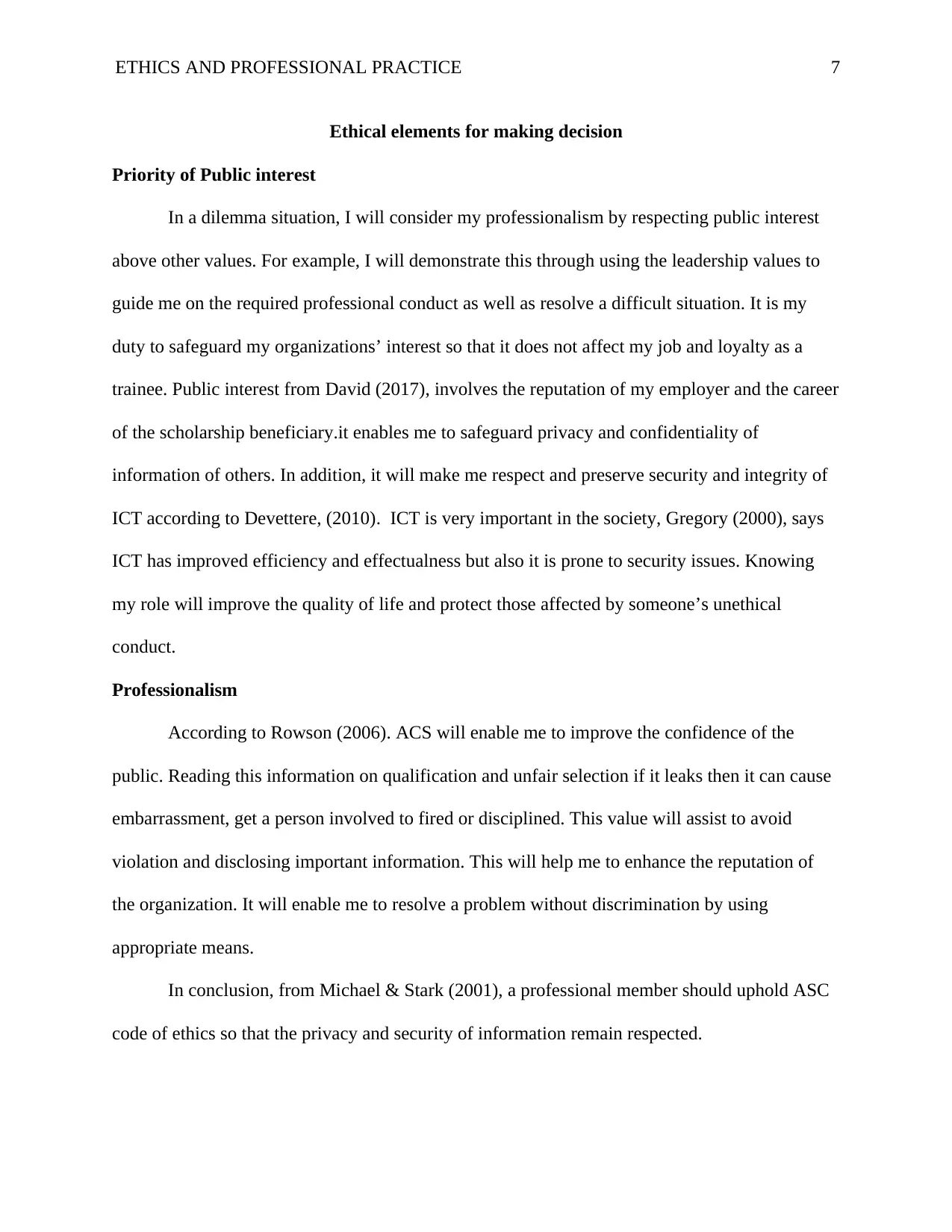
ETHICS AND PROFESSIONAL PRACTICE 7
Ethical elements for making decision
Priority of Public interest
In a dilemma situation, I will consider my professionalism by respecting public interest
above other values. For example, I will demonstrate this through using the leadership values to
guide me on the required professional conduct as well as resolve a difficult situation. It is my
duty to safeguard my organizations’ interest so that it does not affect my job and loyalty as a
trainee. Public interest from David (2017), involves the reputation of my employer and the career
of the scholarship beneficiary.it enables me to safeguard privacy and confidentiality of
information of others. In addition, it will make me respect and preserve security and integrity of
ICT according to Devettere, (2010). ICT is very important in the society, Gregory (2000), says
ICT has improved efficiency and effectualness but also it is prone to security issues. Knowing
my role will improve the quality of life and protect those affected by someone’s unethical
conduct.
Professionalism
According to Rowson (2006). ACS will enable me to improve the confidence of the
public. Reading this information on qualification and unfair selection if it leaks then it can cause
embarrassment, get a person involved to fired or disciplined. This value will assist to avoid
violation and disclosing important information. This will help me to enhance the reputation of
the organization. It will enable me to resolve a problem without discrimination by using
appropriate means.
In conclusion, from Michael & Stark (2001), a professional member should uphold ASC
code of ethics so that the privacy and security of information remain respected.
Ethical elements for making decision
Priority of Public interest
In a dilemma situation, I will consider my professionalism by respecting public interest
above other values. For example, I will demonstrate this through using the leadership values to
guide me on the required professional conduct as well as resolve a difficult situation. It is my
duty to safeguard my organizations’ interest so that it does not affect my job and loyalty as a
trainee. Public interest from David (2017), involves the reputation of my employer and the career
of the scholarship beneficiary.it enables me to safeguard privacy and confidentiality of
information of others. In addition, it will make me respect and preserve security and integrity of
ICT according to Devettere, (2010). ICT is very important in the society, Gregory (2000), says
ICT has improved efficiency and effectualness but also it is prone to security issues. Knowing
my role will improve the quality of life and protect those affected by someone’s unethical
conduct.
Professionalism
According to Rowson (2006). ACS will enable me to improve the confidence of the
public. Reading this information on qualification and unfair selection if it leaks then it can cause
embarrassment, get a person involved to fired or disciplined. This value will assist to avoid
violation and disclosing important information. This will help me to enhance the reputation of
the organization. It will enable me to resolve a problem without discrimination by using
appropriate means.
In conclusion, from Michael & Stark (2001), a professional member should uphold ASC
code of ethics so that the privacy and security of information remain respected.
Paraphrase This Document
Need a fresh take? Get an instant paraphrase of this document with our AI Paraphraser
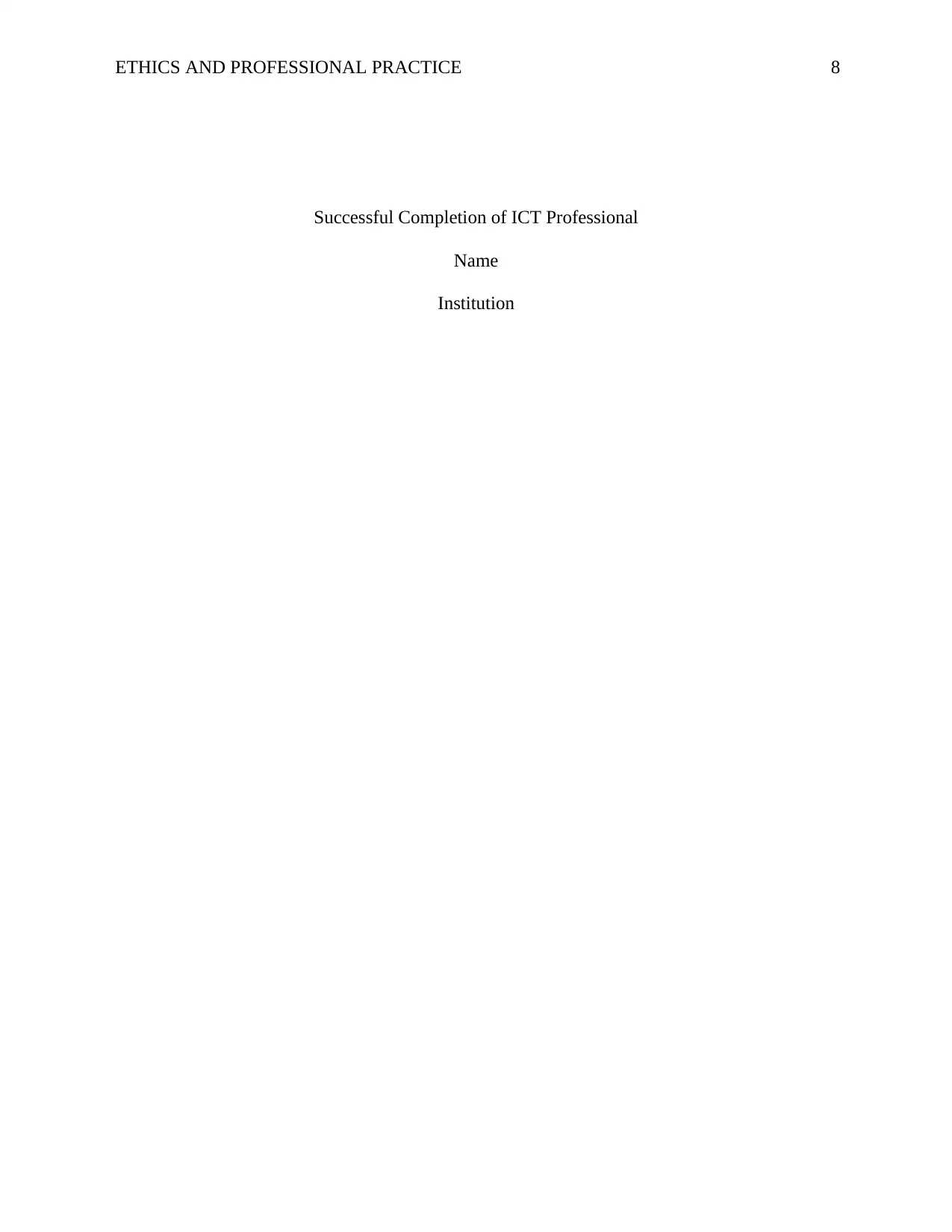
ETHICS AND PROFESSIONAL PRACTICE 8
Successful Completion of ICT Professional
Name
Institution
Successful Completion of ICT Professional
Name
Institution
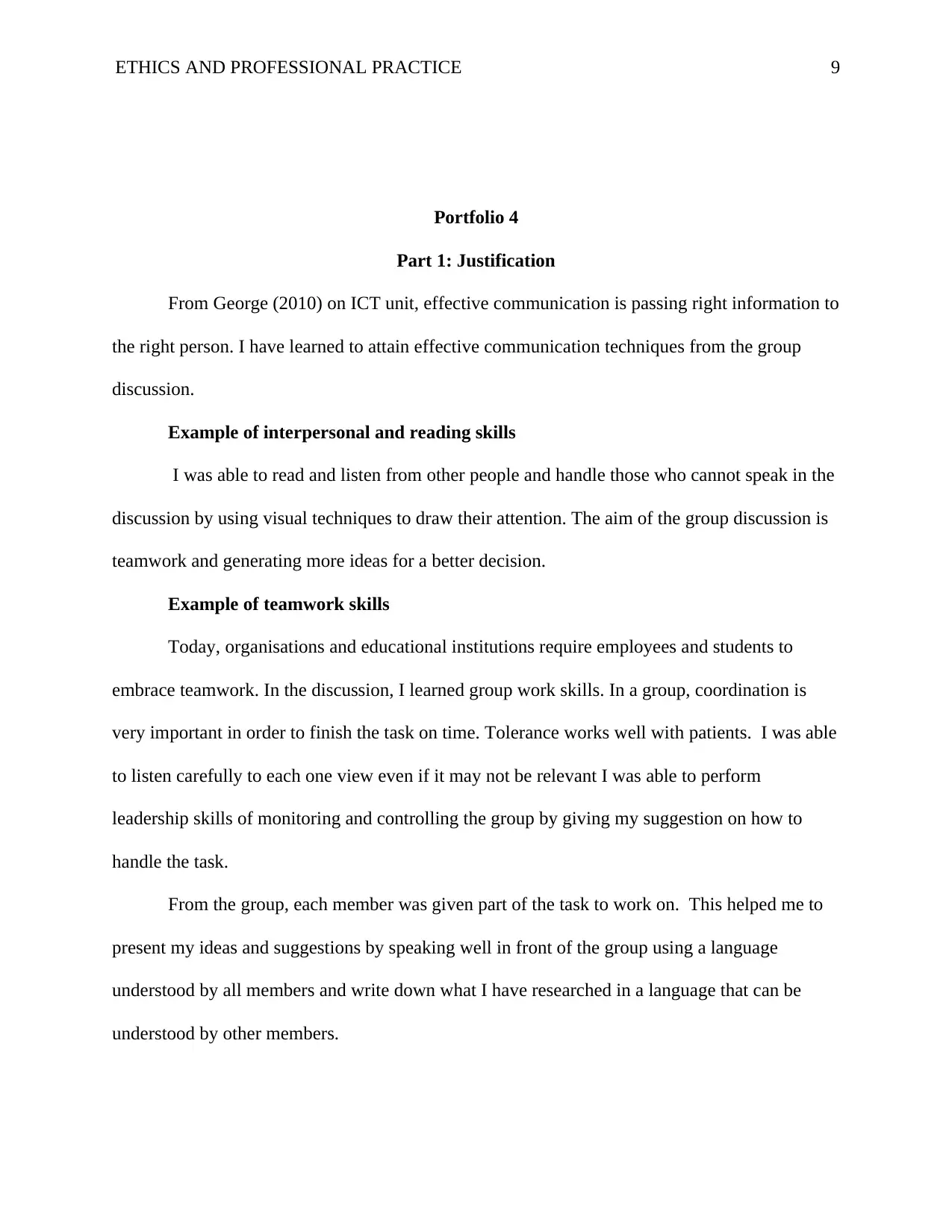
ETHICS AND PROFESSIONAL PRACTICE 9
Portfolio 4
Part 1: Justification
From George (2010) on ICT unit, effective communication is passing right information to
the right person. I have learned to attain effective communication techniques from the group
discussion.
Example of interpersonal and reading skills
I was able to read and listen from other people and handle those who cannot speak in the
discussion by using visual techniques to draw their attention. The aim of the group discussion is
teamwork and generating more ideas for a better decision.
Example of teamwork skills
Today, organisations and educational institutions require employees and students to
embrace teamwork. In the discussion, I learned group work skills. In a group, coordination is
very important in order to finish the task on time. Tolerance works well with patients. I was able
to listen carefully to each one view even if it may not be relevant I was able to perform
leadership skills of monitoring and controlling the group by giving my suggestion on how to
handle the task.
From the group, each member was given part of the task to work on. This helped me to
present my ideas and suggestions by speaking well in front of the group using a language
understood by all members and write down what I have researched in a language that can be
understood by other members.
Portfolio 4
Part 1: Justification
From George (2010) on ICT unit, effective communication is passing right information to
the right person. I have learned to attain effective communication techniques from the group
discussion.
Example of interpersonal and reading skills
I was able to read and listen from other people and handle those who cannot speak in the
discussion by using visual techniques to draw their attention. The aim of the group discussion is
teamwork and generating more ideas for a better decision.
Example of teamwork skills
Today, organisations and educational institutions require employees and students to
embrace teamwork. In the discussion, I learned group work skills. In a group, coordination is
very important in order to finish the task on time. Tolerance works well with patients. I was able
to listen carefully to each one view even if it may not be relevant I was able to perform
leadership skills of monitoring and controlling the group by giving my suggestion on how to
handle the task.
From the group, each member was given part of the task to work on. This helped me to
present my ideas and suggestions by speaking well in front of the group using a language
understood by all members and write down what I have researched in a language that can be
understood by other members.
⊘ This is a preview!⊘
Do you want full access?
Subscribe today to unlock all pages.

Trusted by 1+ million students worldwide
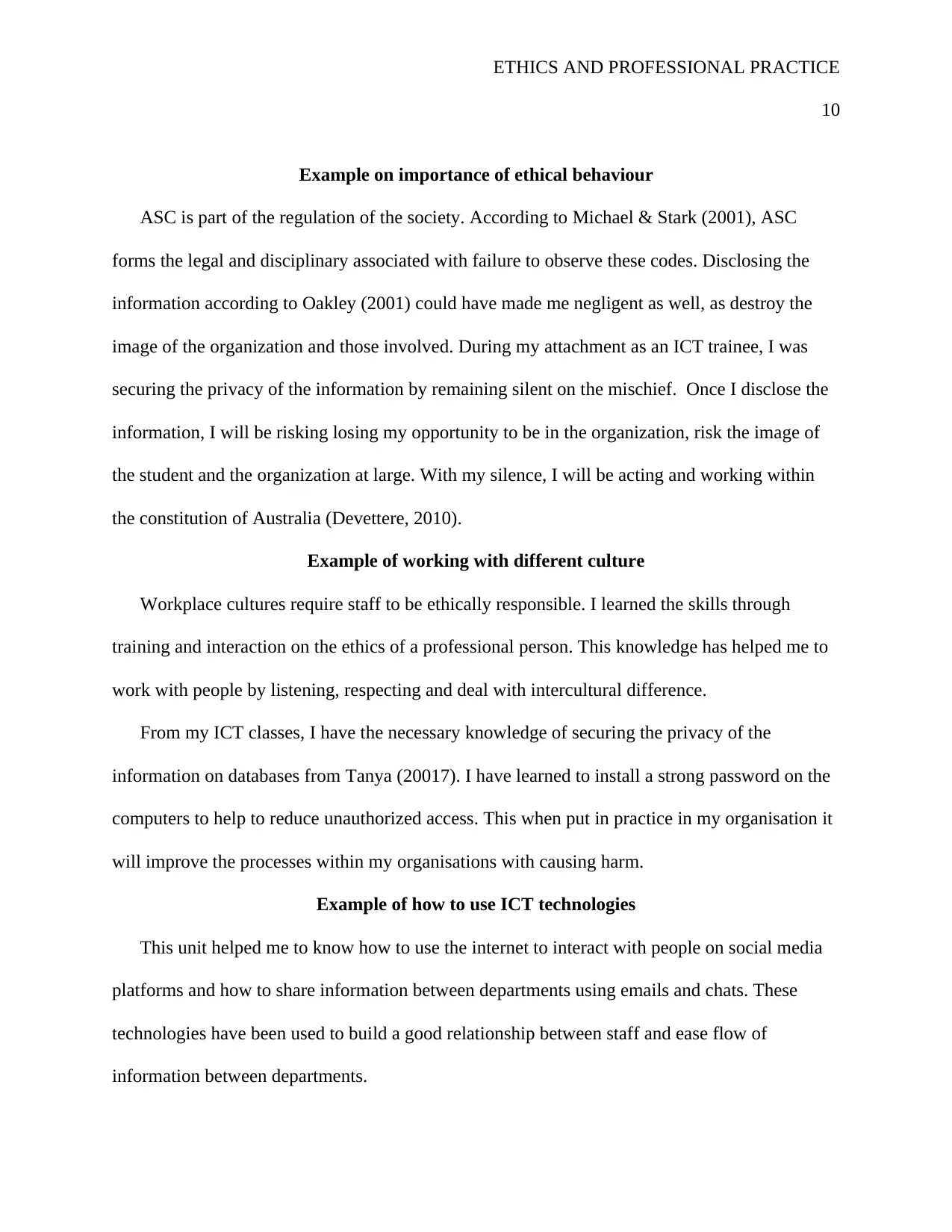
ETHICS AND PROFESSIONAL PRACTICE
10
Example on importance of ethical behaviour
ASC is part of the regulation of the society. According to Michael & Stark (2001), ASC
forms the legal and disciplinary associated with failure to observe these codes. Disclosing the
information according to Oakley (2001) could have made me negligent as well, as destroy the
image of the organization and those involved. During my attachment as an ICT trainee, I was
securing the privacy of the information by remaining silent on the mischief. Once I disclose the
information, I will be risking losing my opportunity to be in the organization, risk the image of
the student and the organization at large. With my silence, I will be acting and working within
the constitution of Australia (Devettere, 2010).
Example of working with different culture
Workplace cultures require staff to be ethically responsible. I learned the skills through
training and interaction on the ethics of a professional person. This knowledge has helped me to
work with people by listening, respecting and deal with intercultural difference.
From my ICT classes, I have the necessary knowledge of securing the privacy of the
information on databases from Tanya (20017). I have learned to install a strong password on the
computers to help to reduce unauthorized access. This when put in practice in my organisation it
will improve the processes within my organisations with causing harm.
Example of how to use ICT technologies
This unit helped me to know how to use the internet to interact with people on social media
platforms and how to share information between departments using emails and chats. These
technologies have been used to build a good relationship between staff and ease flow of
information between departments.
10
Example on importance of ethical behaviour
ASC is part of the regulation of the society. According to Michael & Stark (2001), ASC
forms the legal and disciplinary associated with failure to observe these codes. Disclosing the
information according to Oakley (2001) could have made me negligent as well, as destroy the
image of the organization and those involved. During my attachment as an ICT trainee, I was
securing the privacy of the information by remaining silent on the mischief. Once I disclose the
information, I will be risking losing my opportunity to be in the organization, risk the image of
the student and the organization at large. With my silence, I will be acting and working within
the constitution of Australia (Devettere, 2010).
Example of working with different culture
Workplace cultures require staff to be ethically responsible. I learned the skills through
training and interaction on the ethics of a professional person. This knowledge has helped me to
work with people by listening, respecting and deal with intercultural difference.
From my ICT classes, I have the necessary knowledge of securing the privacy of the
information on databases from Tanya (20017). I have learned to install a strong password on the
computers to help to reduce unauthorized access. This when put in practice in my organisation it
will improve the processes within my organisations with causing harm.
Example of how to use ICT technologies
This unit helped me to know how to use the internet to interact with people on social media
platforms and how to share information between departments using emails and chats. These
technologies have been used to build a good relationship between staff and ease flow of
information between departments.
Paraphrase This Document
Need a fresh take? Get an instant paraphrase of this document with our AI Paraphraser
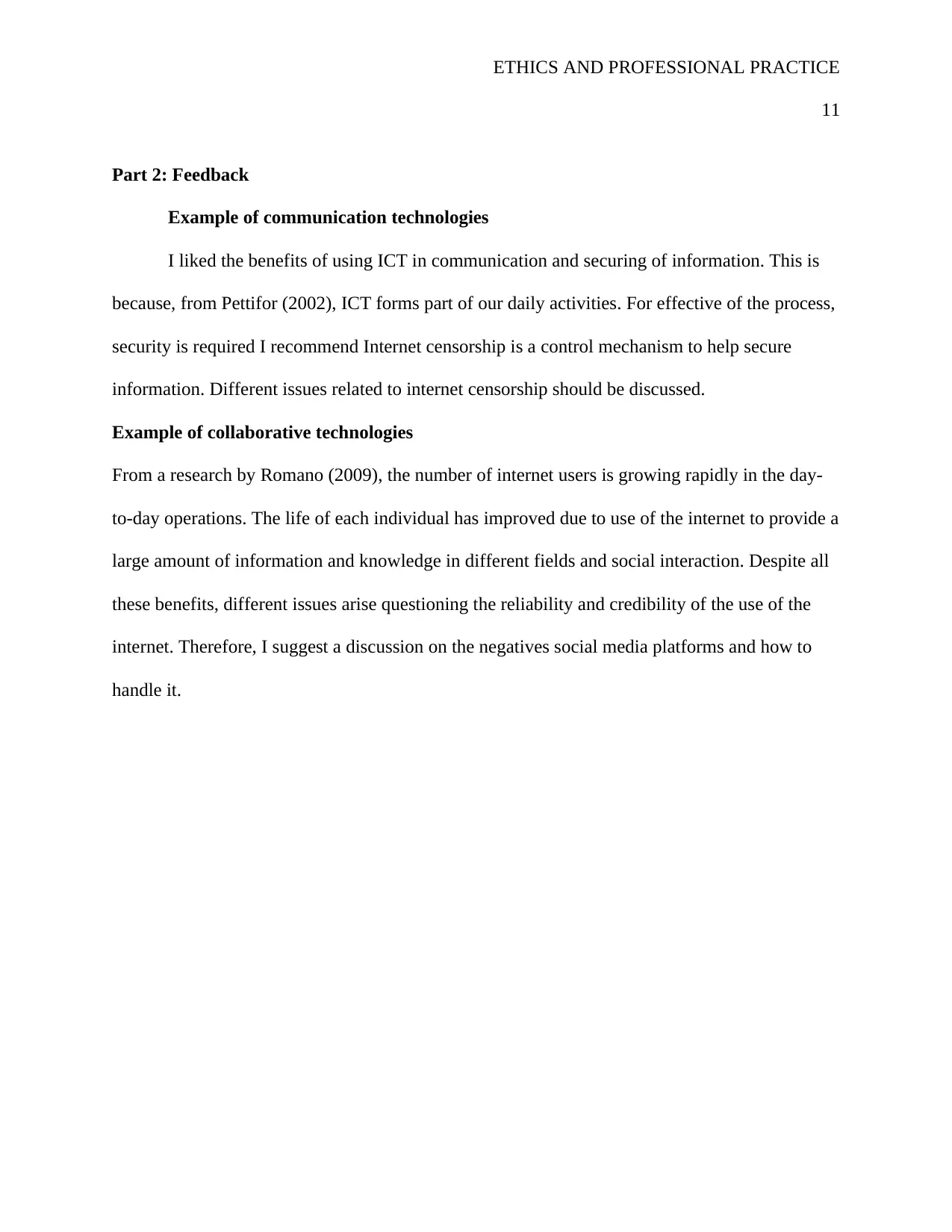
ETHICS AND PROFESSIONAL PRACTICE
11
Part 2: Feedback
Example of communication technologies
I liked the benefits of using ICT in communication and securing of information. This is
because, from Pettifor (2002), ICT forms part of our daily activities. For effective of the process,
security is required I recommend Internet censorship is a control mechanism to help secure
information. Different issues related to internet censorship should be discussed.
Example of collaborative technologies
From a research by Romano (2009), the number of internet users is growing rapidly in the day-
to-day operations. The life of each individual has improved due to use of the internet to provide a
large amount of information and knowledge in different fields and social interaction. Despite all
these benefits, different issues arise questioning the reliability and credibility of the use of the
internet. Therefore, I suggest a discussion on the negatives social media platforms and how to
handle it.
11
Part 2: Feedback
Example of communication technologies
I liked the benefits of using ICT in communication and securing of information. This is
because, from Pettifor (2002), ICT forms part of our daily activities. For effective of the process,
security is required I recommend Internet censorship is a control mechanism to help secure
information. Different issues related to internet censorship should be discussed.
Example of collaborative technologies
From a research by Romano (2009), the number of internet users is growing rapidly in the day-
to-day operations. The life of each individual has improved due to use of the internet to provide a
large amount of information and knowledge in different fields and social interaction. Despite all
these benefits, different issues arise questioning the reliability and credibility of the use of the
internet. Therefore, I suggest a discussion on the negatives social media platforms and how to
handle it.
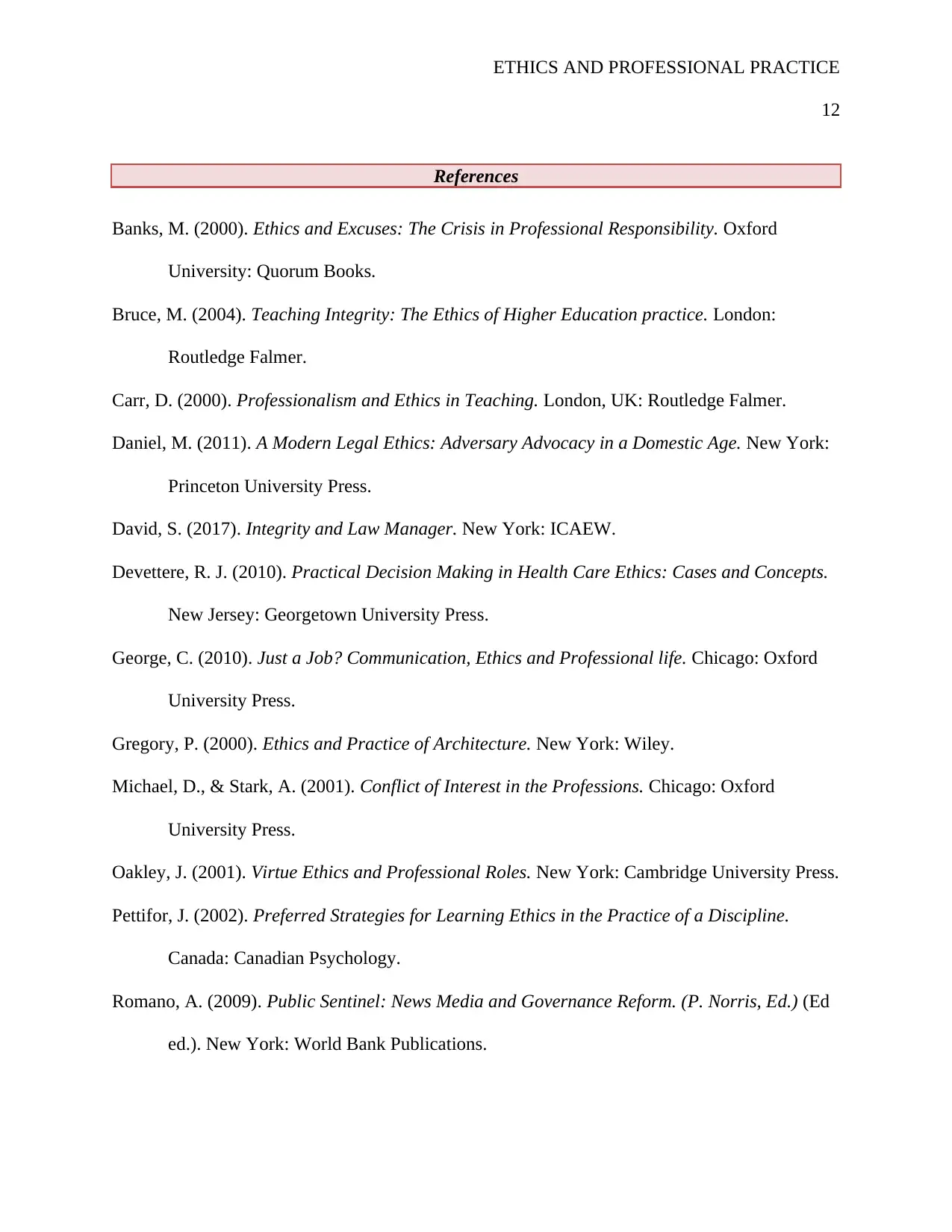
ETHICS AND PROFESSIONAL PRACTICE
12
References
Banks, M. (2000). Ethics and Excuses: The Crisis in Professional Responsibility. Oxford
University: Quorum Books.
Bruce, M. (2004). Teaching Integrity: The Ethics of Higher Education practice. London:
Routledge Falmer.
Carr, D. (2000). Professionalism and Ethics in Teaching. London, UK: Routledge Falmer.
Daniel, M. (2011). A Modern Legal Ethics: Adversary Advocacy in a Domestic Age. New York:
Princeton University Press.
David, S. (2017). Integrity and Law Manager. New York: ICAEW.
Devettere, R. J. (2010). Practical Decision Making in Health Care Ethics: Cases and Concepts.
New Jersey: Georgetown University Press.
George, C. (2010). Just a Job? Communication, Ethics and Professional life. Chicago: Oxford
University Press.
Gregory, P. (2000). Ethics and Practice of Architecture. New York: Wiley.
Michael, D., & Stark, A. (2001). Conflict of Interest in the Professions. Chicago: Oxford
University Press.
Oakley, J. (2001). Virtue Ethics and Professional Roles. New York: Cambridge University Press.
Pettifor, J. (2002). Preferred Strategies for Learning Ethics in the Practice of a Discipline.
Canada: Canadian Psychology.
Romano, A. (2009). Public Sentinel: News Media and Governance Reform. (P. Norris, Ed.) (Ed
ed.). New York: World Bank Publications.
12
References
Banks, M. (2000). Ethics and Excuses: The Crisis in Professional Responsibility. Oxford
University: Quorum Books.
Bruce, M. (2004). Teaching Integrity: The Ethics of Higher Education practice. London:
Routledge Falmer.
Carr, D. (2000). Professionalism and Ethics in Teaching. London, UK: Routledge Falmer.
Daniel, M. (2011). A Modern Legal Ethics: Adversary Advocacy in a Domestic Age. New York:
Princeton University Press.
David, S. (2017). Integrity and Law Manager. New York: ICAEW.
Devettere, R. J. (2010). Practical Decision Making in Health Care Ethics: Cases and Concepts.
New Jersey: Georgetown University Press.
George, C. (2010). Just a Job? Communication, Ethics and Professional life. Chicago: Oxford
University Press.
Gregory, P. (2000). Ethics and Practice of Architecture. New York: Wiley.
Michael, D., & Stark, A. (2001). Conflict of Interest in the Professions. Chicago: Oxford
University Press.
Oakley, J. (2001). Virtue Ethics and Professional Roles. New York: Cambridge University Press.
Pettifor, J. (2002). Preferred Strategies for Learning Ethics in the Practice of a Discipline.
Canada: Canadian Psychology.
Romano, A. (2009). Public Sentinel: News Media and Governance Reform. (P. Norris, Ed.) (Ed
ed.). New York: World Bank Publications.
⊘ This is a preview!⊘
Do you want full access?
Subscribe today to unlock all pages.

Trusted by 1+ million students worldwide
1 out of 13
Related Documents
Your All-in-One AI-Powered Toolkit for Academic Success.
+13062052269
info@desklib.com
Available 24*7 on WhatsApp / Email
![[object Object]](/_next/static/media/star-bottom.7253800d.svg)
Unlock your academic potential
Copyright © 2020–2026 A2Z Services. All Rights Reserved. Developed and managed by ZUCOL.




